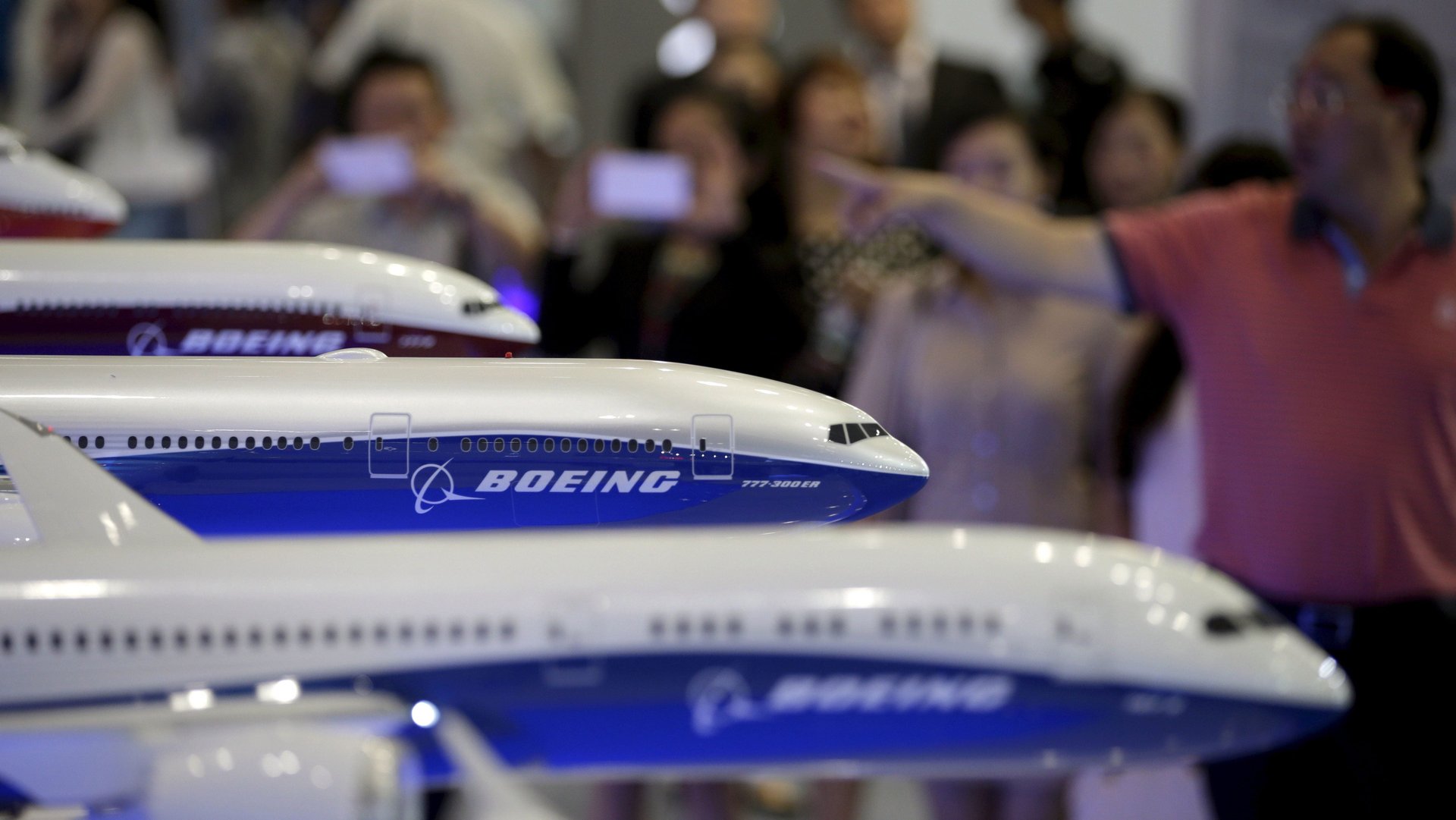Boeing’s share price is a good gauge of the US-China trade war
Aircraft are the US’s biggest export, making up $95 billion in goods leaving the country in the first nine months of this year. About $12.7 billion of those aircraft exports, or 13%, went to China.


Aircraft are the US’s biggest export, making up $95 billion in goods leaving the country in the first nine months of this year. About $12.7 billion of those aircraft exports, or 13%, went to China.
Boeing is America’s biggest exporter of aircraft, which makes its share price a useful gauge for how investors rate the twists and turns of US-China trade relations. The plane maker is also the largest component in the Dow Jones Industrial index.
Consider the past few days.
On Monday (Dec. 3), Boeing closed up 3.8%, as investor sentiment was pretty cheery about the outcome of a weekend meeting between Donald Trump and Xi Jinping at the G20 summit in Buenos Aires. Trump emerged from that meeting agreeing to delay an increase in tariffs slated for Jan. 1 and Xi agreed to buy more US goods; both sides also agreed to keep talking about thornier issues, such as how China supports its wide range of state-owned industries and companies.
A day later, the sentiment changed amid confusion about what president Trump and Xi had actually agreed, as well as a Trump tweet calling himself “Tariff Man.” Boeing ended the day down by nearly 5%.
US markets were closed yesterday, but renewed fears about the US-China relationship surfaced after news broke that the CFO of Chinese telecom equipment group Huawei was arrested in Canada on the US’s request. Boeing’s stock opened down by 3.6% today.
China accounts for about a third of the orders for Boeing’s 737 aircraft, and the company says it expects Chinese buyers to purchase some $1 trillion from the company over the next 20 years. More than half of the commercial aircraft now flying in China are Boeing planes, the company notes.
“Eighty percent of what we build, we deliver outside [the country], so having open, free and fair trade is very important us,” Randy Tinseth, Boeing’s marketing chief, told the Association of Asia Pacific Airlines annual conference in October, according to the South China Morning Post. “Frankly, we have a lot of partners in China. Every airplane we build has parts and assemblies from China, so we continue to emphasize that relationship.”
While Boeing hasn’t been hit too hard by tariffs imposed by the US and China to date, the stock has been buffeted several times this year, whenever concerns about trade have risen. For example, in early April, when China proposed taxes that would mainly affect a type of aircraft that Boeing is phasing out, investors still dumped the stock (paywall). Yet analysts point out it’d be quite difficult for China to slap tariffs on Boeing aircraft when it’s contracted to take delivery of so many of them. In October, the company reported robust earnings and could record its first year of $100 billion revenues. So far this year, Boeing’s stock is up around 12%, versus a flat market overall.
In recent weeks, however, it’s not only the trade war that has weighed on the stock. Investors have also been concerned about the Oct. 29 crash of a Lion Air flight that was using Boeing’s 737 Max 8. The disaster, which killed 189 people, put a spotlight on the aircraft’s new anti-stall feature. This week, Reuters reported that Lion Air was reviewing its $22 billion aircraft purchases from Boeing.
Still, despite concerns and questions about the system, Boeing continues to take orders for and deliver that variant of the 737 to other airlines. Last week it delivered its 2,000th aircraft to China, a 737 Max that went to Xiamen Airlines.